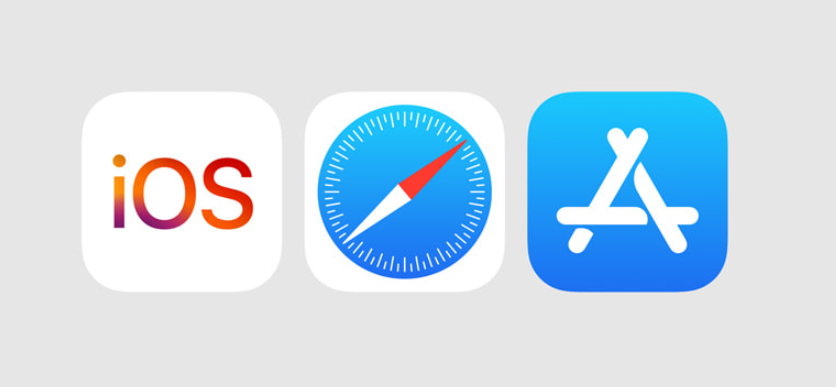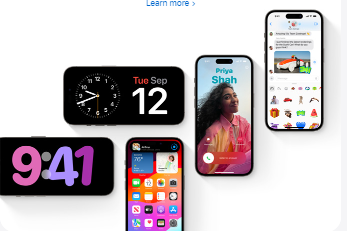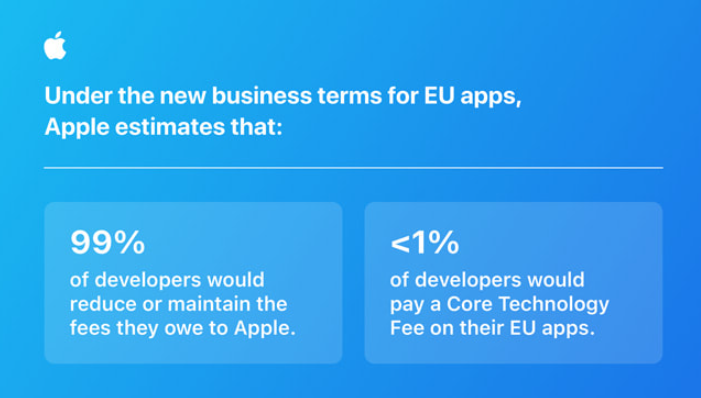Changes iOS
changes iOS, Safari, and the Application Store in the European Association
Apple reports changes iOS, Safari, and the Application Store in the European Association For designers, the progressions incorporate new choices for application circulation and installment handling For clients, (Changes iOS) the progressions incorporate new controls and revelations, and extended insurances to decrease protection and security takes a chance with the DMA makes
CUPERTINO, CALIFORNIA Apple today declared changes iOS , Safari, and the Application Store affecting designers’ applications in the European Association (EU) to consent to the Advanced Business sectors Act (DMA). The progressions incorporate in excess of 600 new APIs, extended application examination, usefulness for elective program motors, and choices for handling application installments and circulating iOS (Changes iOS) applications. Across each change, Apple is presenting new protects that diminish — yet don’t dispense with — new dangers the DMA postures to EU clients.
With these means, Apple will keep on conveying the best, most secure experience feasible for EU clients. The new choices for handling installments and downloading applications on iOS open new roads for malware, misrepresentation and tricks, illegal and destructive substance, and other protection and security dangers. That is the reason Apple is presenting securities — including Notarisation for iOS applications, an authorisation for commercial center engineers, and divulgences on elective installments — to decrease gambles and convey the best, most secure experience workable for clients in the EU. Indeed, even with these shields set up, many dangers remain.
Designers can find out about these progressions on the Apple Engineer Backing page and can start testing new capacities today in the iOS 17.4 beta. The new capacities will open up to clients in the 27 EU nations starting in Walk 2024.
“The progressions we’re declaring today agree with the Computerized Markets Act’s prerequisites in the European Association, while assisting with shielding EU clients from the undeniable expanded protection and security dangers this guideline brings. Our need remains making the best, most secure conceivable experience for our clients in the EU and all over the planet,” said Phil Schiller, Apple Individual. (Changes iOS) “Designers can now find out about the new instruments and terms accessible for elective application appropriation and elective installment handling, new abilities for elective program motors and contactless installments, and that’s only the tip of the iceberg. Critically, engineers can decide to stay based on a similar business conditions set up today on the off chance that they like.”
The progressions for EU applications mirror the European Commission’s assignment of iOS, Safari, and the Application Store as “center stage administrations” under the Advanced Business sectors Act. In Spring, Apple will share new assets to assist EU clients with understanding the progressions they can anticipate. That incorporates direction to assist EU clients with exploring intricacies the DMA’s progressions bring — including a less instinctive client experience — and best practices for moving toward new dangers related with downloading applications and handling installments beyond the Application Store.
Accessible for engineers’ applications all over the planet, Apple additionally declared new choices for streaming games, alongside in excess of 50 impending reports in regions like commitment, trade, application utilization, and that’s just the beginning.
Changes iOS
In the EU, Apple is making various changes iOS to agree with the DMA. For designers, those changes incorporate new choices for appropriating applications. The approaching changes iOS in the EU include:
• New choices for circulating iOS applications from elective application commercial centers — including new APIs and instruments that empower engineers to offer their iOS applications for download from elective application commercial centers.
• New structure and APIs for making elective application commercial centers — empowering commercial center designers to introduce applications and oversee reports in the interest of different engineers from their devoted commercial center application.
• New structures and APIs for elective program motors — empowering designers to utilize program motors, other than WebKit, for program applications and applications with in-application perusing encounters.
• Interoperability demand structure — where engineers can present extra demands for interoperability with iPhone and iOS equipment and programming highlights.
As reported by the European Commission, Apple is additionally sharing DMA-consistent changes affecting contactless installments. That incorporates new APIs empowering engineers to involve NFC innovation in their banking and wallet applications all through the European Monetary Region. What’s more, in the EU, Apple is presenting new controls that permit clients to choose an outsider contactless installment application — or an option application commercial center — as their default.
Definitely, the new choices for engineers’ EU applications make new dangers to Apple clients and their gadgets. Apple can’t kill those dangers, however inside the DMA’s requirements, the organization will do whatever it takes to decrease them. These protections will be set up when clients download iOS 17.4 or later, starting in Spring, and include:
• Notarisation for iOS applications — a pattern survey that applies to all applications, no matter what their dissemination channel, zeroed in on stage uprightness and safeguarding clients. Notarisation includes a mix of computerized checks and human survey.
• Application establishment sheets — that utilization data from the Notarisation interaction to give initially depictions of applications and their usefulness before download, including the engineer, screen captures, and other fundamental data.
• Authorisation for commercial center engineers — to guarantee commercial center designers focus on continuous prerequisites that assist with safeguarding clients and engineers.
• Extra malware securities — that forestall iOS applications from sending off assuming that they’re found to contain malware in the wake of being introduced to a client’s gadget.
These assurances — including Notarisation for iOS applications, and authorisation for commercial center designers — assist with diminishing a portion of the protection and security dangers to iOS clients in the EU. That incorporates dangers like malware or pernicious code, and dangers of introducing applications that distort their usefulness or the dependable engineer.
Notwithstanding, Apple has less capacity to address different dangers — including applications that contain tricks, misrepresentation, and misuse, or that open clients to unlawful, questionable, or destructive substance. Moreover, applications that utilization elective program motors — other than Apple’s WebKit — may adversely influence the client experience, including effects on framework execution and battery duration.
Inside the DMA’s requirements, Apple is focused on safeguarding the protection, security, and nature of the iOS client experience in the EU however much as could be expected. For example, Application Following Straightforwardness will keep on working with applications circulated beyond the Application Store — asking a client’s consent before an engineer tracks their information across applications or sites. Nonetheless, the DMA’s prerequisites imply that Application Store highlights — including Family Buy Sharing and Request to Purchase — won’t be viable with applications downloaded from beyond the Application Store.
At the point when these progressions become effective in Spring, Apple will share more definite assets making sense of the choices accessible to clients — including best practices for safeguarding their protection and security.
Changes to Safari (Changes iOS)
Today, iOS clients as of now can set an outsider internet browser — other than Safari — as their default. Mirroring the DMA’s prerequisites, Apple is likewise presenting another decision screen that will surface when clients first open Safari in Quite a while 17.4 or later. That screen will incite EU clients to pick a default program from a rundown of choices.
This change is a consequence of the DMA’s necessities, and implies that EU clients will be faced with a rundown of default programs before they have the valuable chance to comprehend the choices accessible to them. The screen likewise intrudes on EU clients’ experience whenever they first open Safari proposing to explore to a website page.
Changes to the Application Store
On the Application Store, Mac is sharing various changes for engineers with applications in the EU, influencing applications across Mac’s working frameworks — including iOS, iPadOS, macOS, watchOS, and tvOS. The progressions additionally incorporate new divulgences advising EU clients regarding the dangers related with utilizing options in contrast to the Application Store’s protected installment handling.
For designers, those changes include:
• New choices for utilizing installment specialist organizations (PSPs) — inside a designer’s application to handle installments for computerized labor and products
. • New choices for handling installments by means of connection out — where clients can finish an exchange for computerized labor and products on the designer’s outer site. Designers can likewise educate EU clients regarding advancements, limits, and different arrangements accessible beyond their applications.
• Business arranging apparatuses — for engineers to gauge expenses and comprehend measurements related with Apple’s new business terms for applications in the EU.
The progressions likewise incorporate new moves toward secure and illuminate EU clients, including:
• Application Store item page names — that illuminate clients when an application they’re downloading utilizes elective installment handling.
• In-application exposure sheets — that let clients know when they are done executing with Apple, and when a designer is guiding them to execute utilizing an elective installment processor.
• New Application Survey processes — to confirm that engineers precisely convey data about exchanges that utilization elective installment processors.
• Extended information transportability on Apple’s Information and Security site — where EU clients can recover new information about their use of the Application Store and commodity it to an approved outsider.
For applications that utilization elective installment handling, Apple can not give discounts, and will have less capacity to help clients experiencing issues, tricks, or misrepresentation. Supportive Application Store highlights — like Report an Issue, Family Sharing, and Request to Purchase — will likewise not mirror these exchanges. Clients might need to impart their installment data to extra gatherings, setting out additional open doors for troublemakers to take delicate monetary data. What’s more, on the Application Store, clients’ buy history and membership the executives will just reflect exchanges made utilizing the Application Store’s In-Application Buy framework.
New Business Expressions for Applications in the EU
Likewise today, Apple is sharing new business terms accessible for designers’ applications in the European Association. Engineers can decide to take on these new business terms, or remain on Apple’s current conditions. Engineers should embrace the new business terms for EU applications to involve the new capacities for elective dissemination or elective installment handling. The new business terms for applications in the EU are important to help the DMA’s prerequisites for elective appropriation and installment handling.
That incorporates a charge structure that mirrors the numerous ways Apple makes an incentive for designers’ organizations — remembering dispersion and revelation for the Application Store, the Application Store’s protected installment handling, Apple’s trusted and secure versatile stage, and every one of the devices and innovation to fabricate and share imaginative applications with clients all over the planet.
Designers working under one or the other arrangement of business terms can keep on utilizing the Application Store’s safe installment handling and offer their applications on the Application Store in the EU. Furthermore, the two arrangements of business terms mirror Apple’s well established work to make the application environment the best an open door for all engineers.
Designers working under the new business terms will have the choice to disseminate their iOS applications from the Application Store or potentially elective application commercial centers. These engineers can likewise decide to involve elective installment processors in their EU applications on the Application Store, across Apple’s working frameworks.
The new business terms for iOS applications in the EU have three components:
• Decreased commission — iOS applications on the Application Store will pay a diminished commission of either 10% (for by far most of designers, and memberships following their most memorable year) or 17% on exchanges for computerized labor and products.
• Installment handling charge — iOS applications on the Application Store can utilize the Application Store’s installment handling for 3 extra percent expense. Engineers can utilize an installment specialist co-op inside their application or connection clients to their site to deal with installments for no extra expense to Apple.
• Center Innovation Expense — iOS applications disseminated from the Application Store as well as an option application commercial center will pay €0.50 for every first yearly introduce each year more than a 1 million limit.
For applications on iPadOS, macOS, watchOS, and tvOS in the EU, designers who process installments utilizing a PSP or by connecting out to their site will get a 3 percent rebate on the commission they owe to Macintosh.
Apple is likewise sharing a charge mini-computer instrument and new reports to assist engineers with assessing the expected effect of the new business terms on their application organizations. Designers can more deeply study the progressions for EU applications on another Apple Engineer Backing page and can start testing these abilities today in the iOS 17.4 beta.
About
Apple reformed individual innovation with the presentation of the Mac in 1984. Today, Mac drives the world in development with iPhone, iPad, Macintosh, Mac Watch, and Mac television. Mac’s five programming stages — iOS, iPadOS, macOS, watchOS, and tvOS — give consistent encounters across all Mac gadgets and engage individuals with advanced administrations including the Application Store, Macintosh Music, Mac Pay, and iCloud. Apple’s in excess of 100,000 representatives are devoted to making the best items on the planet, and to leaving the world better than we tracked down it.




